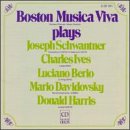| All Artists: Joseph Schwantner, Charles Ives, Luciano Berio, Mario Davidovsky, Donald Harris, Boston Musica Viva, Paul Birttan, Paul Brittan, Evelyn Zuckerman, Elsa Charlston Title: Boston Musica Viva Plays... Members Wishing: 0 Total Copies: 0 Label: Delos Records Release Date: 12/14/1992 Genres: Pop, Classical Styles: Vocal Pop, Opera & Classical Vocal, Chamber Music, Historical Periods, Modern, 20th, & 21st Century Number of Discs: 1 SwapaCD Credits: 1 UPC: 013491101125 |
Search - Joseph Schwantner, Charles Ives, Luciano Berio :: Boston Musica Viva Plays...
 | Joseph Schwantner, Charles Ives, Luciano Berio Boston Musica Viva Plays... Genres: Pop, Classical
|
Larger Image |
CD Details |
CD ReviewsChamber Music from the Academy Dr. Christopher Coleman | HONG KONG | 02/17/2001 (4 out of 5 stars) "During the 50's through the mid-80's contemporary art music became more and more estranged from its audience, especially in the United States. Were it not for the universities, where composers managed to earn their livings not through composing, but through teaching, this music might have died altogether. Curiously, though, the almost absolute removal from the mainstream made contemporary art music even more rarified. It became a sort of aesthetic Giant Panda, unable to survive except in the most protected of environments. Fortunately the times have changed and many, if not most, academic composers have for a time at least left their refuge for a stroll around the wider world. But this disc, originally released in 1987, is an artifact from that unhappy time (with the exception of the Ives, which harks back even earlier).Six pieces are featured, and of them two pieces epitomize the rather hard-to-love uncompromising aesthetic stance of the times: the first work on the disc by Joseph Schwantner, Consortium I (an early work, written when he was 20) and the last work, Ludus II by Donald Harris. Both pieces are scored for a quintet of mixed instruments and are unrelenting in their approach. Characterized by flurries of activity alternating with moments of relative stillness, the angular polyphony yields little for the average listener in the way of melodic line and nothing of traditional harmonic motion. Mario Davidovsky's Synchronisms #3 for Cello and Tape, in an amazing performance by cellist Jay Humeston, is similarly difficult, but the timbral variety and interaction between the cello and the electronic sounds and the astonishing virtuosity of Humeston provide a richer aesthetic reward.Schwantner's In Aeternum (Consortium IV) was composed three years after his Consortium I, and demonstrates a greater maturity and accessibility. Although much of the work is still angular, polyphonic and difficult, some contrasting passages are stunning in their beauty. This effect is achieved though unusual tone colors (especially crystal glasses and water gongs) and slower, simpler harmonic structures. Schwantner's success owes much to George Crumb, but interestingly this work predates by three years Crumb's more well-known Dream Sequence (Images II), which shares similarly remarkable timbral and harmonic ideas.Rounding out the disc are two short pieces which allow some relief from the works mentioned above. Berio's O, King, a piece which is more well known in its orchestrated and expanded version as the third movement of his remarkable Sinfonia, is here given a rather passionless performance. Although the work includes a singer, to call it a song would be incorrect. The text of the piece is made up solely of the phonemes of Martin Luther King's name, and the singer is simply an equal to the other instrumentalists in the slow accumulation of activity and texture the piece presents. Having heard it in live performance, and having conducted it before, I know that it can be a very powerfully moving work. It seems that the Boston Musica Viva let down their guard because of its relative simplicity, and the piece suffers as a result. Charles Ives' Largo for clarinet, violin and piano is the most accessible piece on the disc, and curiously the least rewarding. Like much of Ives' music, this is more an idea of structural juxtaposition than a finely wrought work with refined details. As such it has some historical interest, and does make a significant contrast (too much so, in my opinion) with the other works on this recording; but doesn't call for repeated listening."
|

 Track Listings (6) - Disc #1
Track Listings (6) - Disc #1